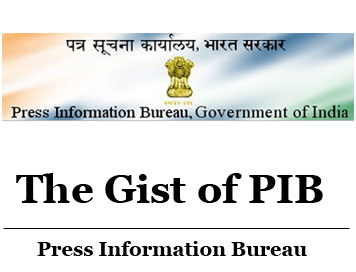(THE GIST OF PIB) Panchayat Advancement Index

(THE GIST OF PIB) Panchayat Advancement Index
(MAY-2025)
Panchayat Advancement Index
-
Recently, the Ministry of Panchayati Raj organised a two-day national write-shop on rolling out of Panchayat Advancement Index (PAI) Version 2.0 for the financial year 2023-24 in New Delhi.
About Panchayat Advancement Index:
-
It is a multi-domain and multi-sectoral indexthat is intended to be used to assess the overall holistic development, performance & progress of Panchayats.
-
It aims to assess and measure the progress made by grassroots-level institutions in achieving localized SDGs, thereby contributing to the attainment of SDG 2030.
-
The index takes into account various socio-economic indicators and parameters to gauge the well-being and development status of the local communities within the jurisdiction of a Panchayat.
-
One of the purposes of the PAI is to identify the development gaps of the Panchayats through the scores achieved across various LSDG themes and enable the Panchayat for evidence-based planning at grassroots level.
-
It has been compiled based on 435 unique local Indicators (331 mandatory & 104 optional) consisting of 566 unique data points across 9 themes of LSDGs (Localization of Sustainable Development Goals) aligned with National Indicator Framework (NIF) of the Ministry of Statistics and Programme Implementation (MoSPI).
-
The PAI reflects India’s commitment to achieving the SDG 2030 Agenda through participatory, bottom-up development.
-
Based on the PAI scores & thematic Scores achieved by different Gram Panchayats, these GPs are grouped into one of the categories of performance – Achiever: (90+), Front Runner: (75 to below 90); Performer: (60 to below 75); Aspirant: (40 to below 60) and Beginners (below 40).
-
While PAI Version 1.0 served as the baseline and covered data from 2.16 lakh Gram Panchayats across 29 States/UTs, PAI Version 2.0 represents a major leap forward in functionality, efficiency, and usability.
-
The transition from PAI 1.0 to 2.0 reflects a focused refinement of the framework, with a sharper and more practical set of indicators and data points to improve usability and reliability while retaining thematic comprehensiveness.
CLICK HERE TO DOWNLOAD FULL PDF
CLICK HERE TO DOWNLOAD UPSC E-BOOKS
Study Material for UPSC General Studies Pre Cum Mains
Get The Gist 1 Year Subscription Online
Click Here to Download More Free Sample Material
<<Go Back To Main Page
Courtesy: PIB


